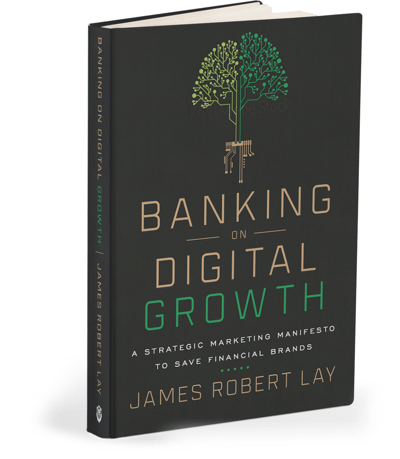“Not only do we not have the skills from not having practiced for our money, we are then conditioned to think every financial conversation has to be negative when it should be the opposite.” -Dr. Megan McCoy
In her work as a licensed marriage and family therapist, Dr. Megan McCoy has noticed that many of the couples and families she meets are experiencing major money struggles. Yet most other therapists in her field don’t know how to help people address their financial woes.
“A whole bunch of mental health professionals were like, ‘All my clients are doing is talking about money, and I don’t have training in money,’” Megan says. Unlike her colleagues, Megan is also a certified financial therapist, a director of financial planning in the master’s program at Kansas State University, and the associate editor of the Journal of Financial Therapy.
Megan shared her unique insights on money and mental health with James Robert Lay on the Banking on Digital Growth Podcast.
What is Financial Therapy?
Financial therapy is a relatively new concept that gained prominence in the early 2000s. When the 2008 Great Recession hit, mental health professionals saw a sharp rise in the number of patients who needed urgent mental health counseling due to concerns about money.
At the same time, Megan recalls, financial planners were noticing that many of their clients needed mental health counseling they weren’t qualified to provide. Colleagues told Megan, “My clients are so upset, so stressed, so anxious. I don't know what to do."
The mental health professionals and financial planning professionals decided to lean on each other to find a solution. The Financial Therapy Association was born. Today, it has about 300 to 400 members providing services to help people reach financial well-being, which is the overall goal of financial therapy.
Financial Confidence vs. Confusion
Most everyday financial assistance focuses on teaching people about interest rates, loans, and financial products available in the marketplace. This type of instruction views them as customers instead of human beings and completely misses their biggest problem: They lack confidence.
When you lack confidence in your financial life, you descend into confusion and frustration. Now you’re in a constant state of chaos, where every additional financial decision feels completely overwhelming. In this state, people tend to make terrible financial choices.
This bleeds over into chaos in interpersonal relationships, including family and partner relationships. Money is consistently rated as one of the top issues in divorces.
“We have such a strong money taboo in our culture,” Megan says. “We don't want to talk about money. We're told not to talk about money because if we realize we have more than others, we feel icky. If we realize we have less than others, we feel icky.”
This leads to a feeling that every financial conversation is going to be negative, which doesn’t have to be the case. Megan sees many opportunities for positive financial conversations if we ask the right questions.
- What are your dreams for the future?
- What are your financial values?
- How do you want to spend your money, based on your dreams and values?
Why Does Money Cause Shame?
James Robert recommends Tammy Lally’s TED talk, Money Shame, about the belief systems that are buried in our family origins. Parents pass down financial habits to their children, positive or negative, and create an inherited set of beliefs about money.
Megan explains that this relates to the financial-psychological model known as a money genogram, which traces patterns of behavior back to early memories regarding money. People hold unconscious beliefs about money - true or untrue - and from these childhood expectations, they progress through a lifetime of making wise and unwise financial choices.
This is why some of today’s most successful money mentorship programs involve going beyond financial planning to incorporate human psychology. For example, Tropical Financial’s GetBeyondMoney program arose after they worked with Digital Growth University to address people’s deeper motivations for seeking financial stability.
James Robert points out that 70% to 85% of people feel financial stress in some fashion. Even people who work in the financial industry and seem to have their finances ostensibly “in order” feel financial stress.
In fact, some in the field might suffer from impostor syndrome, as if they’re faking their way through maintaining an image of financial stability. Behind the scenes, they often have the same problems as the people they’re trying to help.
The Transtheoretical Change Model
Eliminating society’s taboos and stigmas around money would go a long way toward helping people feel more financially stable. Megan says it’s important to focus on building financial resilience, which means helping people bounce back after minor struggles to prevent them from descending into full-fledged financial disasters.
In the transtheoretical change model, an action requires multiple steps and only about 20% of Megan’s clients feel ready for the first action step. Unfortunately, some financial professionals try to get people to take huge steps too soon, before developing the right mindset.
What’s the right mindset?
Think of it as a curious mindset or a “not knowing” mindset where the person feels curious enough to seek new knowledge. This mindset helps them understand why they haven’t taken these steps yet, then encourages them to feel safe enough to move forward.
James Robert shares that early in his career, he was working so hard that he wasn’t realizing the impact of his workaholism on his family. “I worked hard, I grinded, I hustled, I put in 80 to 100 hours a week to build the business. We had our first kid, we had our second kid … Very, very successful financially until one day my wife is like, ‘It's the business or it's the family.’”
He realized that he needed a type of therapy that would help him gain perspective on his life. He felt that he needed an Obi-Wan or a Yoda to guide him to the next stage in his life.
Megan points out that great financial mentors don’t tell you what to do. They help you see the right path for yourself. Regarding Obi-Wan and Yoda, she says, “Neither of them were like, ‘Anakin, this is what you have to do. Or Skywalker, this is what you have to do.’”
Numerous studies on mental health therapy, Megan says, have shown that the less a therapist says, the more effective the session will be. There’s power in giving someone a safe space to simply come to grips with their problems and talk through potential solutions.
James Robert relates this to research that shows financial literacy programs are, in some cases, doing more harm than good. Some studies find that these programs give people false confidence about their financial status and fail to measure financial self-efficacy.
There’s a difference between confidence and self-efficacy. Confidence is feeling generally good about yourself. Financial self-efficacy is feeling that if a problem arises, you can face it head-on and overcome it. Self-efficacy is a specific type of confidence that helps you problem-solve, rather than just generally feeling confident.
Self-efficacy also welcomes additional viewpoints rather than staying too arrogant to hear them. Megan explains, “Financial self-efficacy says, ‘Okay, now I'm about to enter this new situation. Let me get my resources. Let me go to the right website. Let me ask the right people to enter into this problem.’ And I think that's missing in financial education.”
Financial brands can help their audiences build self-efficacy by creating thoughtful, robust financial wellness programs. Rather than just printing a few brochures, work as an authentic financial and mental health partner. Listen to their problems and respond to them with helpful, customized solutions.
Building self-efficacy isn’t quick, which is one of the reasons people might struggle to do it at first. It’s easier to grab low-hanging fruit and seek quick fixes for your financial stress. But financial health is a lifelong pursuit. Nourish your sense of financial wellness properly, and it will bear fruit for years to come.
To learn more about money and mental health, connect with Dr. Megan McCoy on LinkedIn or reach out to James Robert Lay at the Digital Growth Institute.
This article was originally published on February 1, 2023. All content © 2024 by Digital Growth Institute and may not be reproduced by any means without permission.


